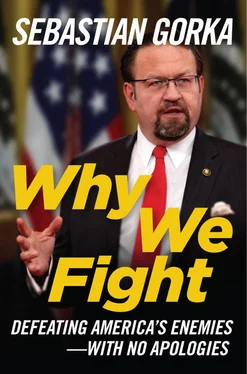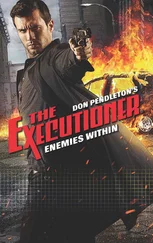Sebastian Gorka - Why We Fight - Why We Fight - Defeating America's Enemies - With No Apologies
Здесь есть возможность читать онлайн «Sebastian Gorka - Why We Fight - Why We Fight - Defeating America's Enemies - With No Apologies» весь текст электронной книги совершенно бесплатно (целиком полную версию без сокращений). В некоторых случаях можно слушать аудио, скачать через торрент в формате fb2 и присутствует краткое содержание. Город: Washington, Год выпуска: 2018, ISBN: 2018, Издательство: Regnery Publishing, Жанр: Политика, Публицистика, на английском языке. Описание произведения, (предисловие) а так же отзывы посетителей доступны на портале библиотеки ЛибКат.
- Название:Why We Fight: Why We Fight: Defeating America's Enemies - With No Apologies
- Автор:
- Издательство:Regnery Publishing
- Жанр:
- Год:2018
- Город:Washington
- ISBN:978-1-62157-640-2
- Рейтинг книги:5 / 5. Голосов: 1
-
Избранное:Добавить в избранное
- Отзывы:
-
Ваша оценка:
- 100
- 1
- 2
- 3
- 4
- 5
Why We Fight: Why We Fight: Defeating America's Enemies - With No Apologies: краткое содержание, описание и аннотация
Предлагаем к чтению аннотацию, описание, краткое содержание или предисловие (зависит от того, что написал сам автор книги «Why We Fight: Why We Fight: Defeating America's Enemies - With No Apologies»). Если вы не нашли необходимую информацию о книге — напишите в комментариях, мы постараемся отыскать её.
Why We Fight: Why We Fight: Defeating America's Enemies - With No Apologies — читать онлайн бесплатно полную книгу (весь текст) целиком
Ниже представлен текст книги, разбитый по страницам. Система сохранения места последней прочитанной страницы, позволяет с удобством читать онлайн бесплатно книгу «Why We Fight: Why We Fight: Defeating America's Enemies - With No Apologies», без необходимости каждый раз заново искать на чём Вы остановились. Поставьте закладку, и сможете в любой момент перейти на страницу, на которой закончили чтение.
Интервал:
Закладка:
And then there was my father’s mode of interacting with the world. Despite the torture, the imprisonment, and the life of an exile, my father was amazingly “normal.” He wasn’t ever bitter or maladjusted. On the contrary, he loved the company of good people and perhaps trusted others a little too readily—more so than his cynical son, who had grown up in a free country. Despite all he had gone through, he told me that the only thing he was truly angry about was being deprived of the opportunity to row for Hungary in the Olympics. He had inherited his athletic ability from his father, Agoston, an Olympian and the fastest long-distance runner in Hungary between the wars. When my father was arrested at age twenty, he was a member of the Hungarian national rowing team. But I never saw him fulminate at what had been done to him. In fact, the only time I ever saw my father cry was when someone mentioned the name of Bela Bajomi, or of other fellow patriots who had made the ultimate sacrifice in the fight for freedom.
It was in this world that I learnt what justice is and that truth is not relative. From earliest childhood it was clear: evil walks the earth, and from time to time a man must resist it, often at great cost. That is why when the terror attacks of September 11, 2001, occurred, I processed them quite differently from my friends and those around me.
The perpetrators of the deadliest terrorist assault in modern times were connected in my mind to the totalitarians of the twentieth century, who had almost destroyed Judeo-Christian civilization. Yes, the al-Qaeda operatives did what they did in the name of a religion and not a godless ideology like fascism or communism, but the nineteen hijackers of 9/11 were brethren to the German soldiers who abused my father’s Jewish friends. They were cut from the same cloth as the thugs who tortured him in the basement of the secret police headquarters on Andrassy Street and partisans of a cause that would admit no compromise. Bin Laden’s “soldiers,” like Hitler’s Gestapo, would kill or enslave you if you dared resist.
It was this perspective on the threat America and the West faced in the new century that would eventually bring me to the United States to explain that connection to the brave men and women of our military and law enforcement and what it would take to defeat the “new totalitarians.” From the Green Berets of Fort Bragg to the Special Agents of the FBI, the analysts of the CIA, and the SEALs of the US Navy, I have shared the same message: “The loss of liberty is always but one generation away.” There will always be those—whether they are Hitler’s divisions, Stalin’s spies, today’s jihadists, or tomorrow’s unknown threat—who would rob us of our freedom and destroy the values of our Judeo-Christian civilization if our vigilance flags.
I was born in England, and Hungarian blood runs in my veins, but I am a proud American and legal immigrant to the greatest nation on God’s earth. It was the highest honor of my life to serve as deputy assistant and strategist to President Donald Trump.
This book builds upon Defeating Jihad, but has a broader scope and a different structure. It is the product of my twenty-four years in the national security sector, both in government and in the private and academic sectors. It is a guide to the most important facts all Americans should know about the threats our nation faces now and will face in the future. But it is more than that.
Both the early nineteenth century Prussian General Carl von Clausewitz, in his classic work On War , and the ancient Chinese strategist Sun Tzu, in The Art of War , taught that the central aspect of all conflict is the will to win. To be sure, you must be able to inflict damage on your opponent—it is hard to defeat a tank with a bow and arrow—but the most important ingredient for victory is a will to win that is greater than your enemy’s. From ancient Greece to the Vietnam War and to what we used to call the Global War on Terror, this has always been the case.
Yet having taught in our civilian and military institutions of higher education, such as Georgetown University and the National Defense University in Washington, I see America as a nation all too often forgetting this eternal truth. We fail to take seriously the key lines from the Marine Corps manual MCDP 1, Warfighting : “Although material factors are more easily quantified, the moral and mental forces exert a greater influence on the nature and outcome of war,” which is “an extreme test of will.”
To help correct that failure, I present here a handful of examples of men who had that crucial will to fight. Some are well known, such as Stephen Decatur, a central figure in a pivotal conflict early in the life of the nation, the Barbary Wars. Others are less famous but are of equal importance as exemplars: Chesty Puller, the most decorated marine in American history; Captain Eugene McDaniel, a naval pilot shot down in Vietnam who survived the horrors of Viet Cong prisons for six years; and Whittaker Chambers, not a warrior, but a hero nonetheless because of his resistance to totalitarianism and his commitment to the truth.
Their stories will provide inspiration for the new generation of defenders of the republic, a generation we all must encourage and build. For without an America of heroes ready to fight and win, the future will belong to those who serve the latest totalitarian incarnation of evil.
CHAPTER 1
Why We Must Always Be Ready to Fight
Si vis pacem para bellum . If you desire peace prepare for war.
—PUBLIUS FLAVIUS VEGETIUS RENATUSNo right-minded person likes violence or the threat of violence. Nevertheless, there seems to be something about human society that predisposes us to use force again and again. On the individual level, violence is driven most often by avarice: the desire to obtain a material good without paying or working for it. At the collective level, when violence is used in a large-scale, organized fashion, the same motivation may hold: one community wishes to take the territory or wealth of another community. But there may be other reasons as well.
Human history is, in large part, the history of war. Over the millennia, the formation and development of human communities have been marked by wars between tribes, wars between city-states, wars between empires, and wars between modern nations. The last century can crudely be summarized as starting with World War I, in which the West lost a generation of young men in the trenches; proceeding through World War II, in which civilians were targeted on a massive scale and more than sixty million persons died; and concluding with four decades of the Cold War, a face-off between two alliance systems during which the horrific possibility of nuclear conflict haunted the whole world. At the fall of the Berlin Wall and the end of the Cold War, however, peace did not “break out.” The end of the twentieth century saw hot wars of the intra-state variety break out in countries as far-flung as Yugoslavia and Rwanda, conflicts that killed more than a million human beings, often in the most barbaric of ways.
The opening of the twenty-first century offered little hope of a new, more peaceful age. On September 11, 2001, a handful of religiously motivated fanatics managed to execute the deadliest terrorist attack in world history. In less than two hours, almost three thousand people were killed in the synchronized attacks on New York and Washington. Since that infamous day that we now refer to simply as “9/11,” America and her have initiated wars in Afghanistan and Iraq, deployed military units to numerous conflict zones in the Middle East and Africa, and initiated a military campaign against the jihadist insurgents of the Islamic State in Syria and Iraq. The first two decades of the new century seem to have marked a return to what specialists call “irregular war”—conflicts in which the enemy forces are not the conventional troops of another government, but terrorists and insurgents of non-state actors such as al-Qaeda or ISIS, the so-called Islamic State.
Читать дальшеИнтервал:
Закладка:
Похожие книги на «Why We Fight: Why We Fight: Defeating America's Enemies - With No Apologies»
Представляем Вашему вниманию похожие книги на «Why We Fight: Why We Fight: Defeating America's Enemies - With No Apologies» списком для выбора. Мы отобрали схожую по названию и смыслу литературу в надежде предоставить читателям больше вариантов отыскать новые, интересные, ещё непрочитанные произведения.
Обсуждение, отзывы о книге «Why We Fight: Why We Fight: Defeating America's Enemies - With No Apologies» и просто собственные мнения читателей. Оставьте ваши комментарии, напишите, что Вы думаете о произведении, его смысле или главных героях. Укажите что конкретно понравилось, а что нет, и почему Вы так считаете.












